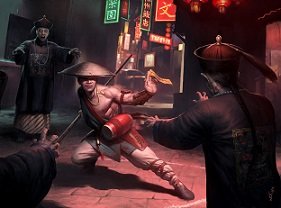10,000 Years of Strangeness: A Paranormal Primer for Ancient and Modern China
Part III: Mysteries and Legends
Chapter 12: Vampire Zombies of China—僵尸
Chapter 12: Vampire Zombies of China—僵尸
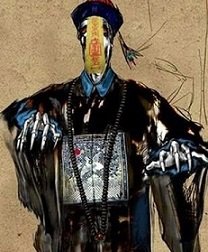
Previous Chapters 前章: Part 1: Chapter 1, Ch 2, Ch 3, Ch 4, Ch 5-1, Ch 5-2, Ch 5-3, Ch. 6
Previous Chapters 前章: Part 2: Chapter 7, Ch 8-1, Ch 8-2, Ch 8-3, Ch 8-4, Ch 8-5, Ch 9, Ch 9
Previous Chapters 前章: Part 3: Chapter 10, Chapter 11-1, Chapter 11-2
Previous Chapters 前章: Part 3: Chapter 10, Chapter 11-1, Chapter 11-2
What happens when you need to transport a dead relative home but don’t have money for transportation? Easy! You get a Taoist priest or adept to animate the corpse and let it walk home. At least that’s what the locals say is the origin of the jiangshi (僵尸), a kind of Chinese zombie brought to life through magical Taoist incantations stuck to their foreheads.
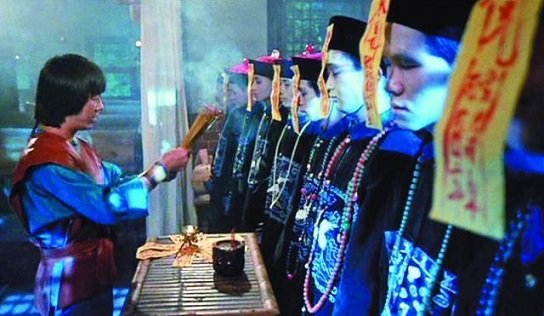
This sounds like a simple solution to transporting corpses. They hop (literally) to their destination, and then are “de-animated” by a Taoist priest or adept for funeral rights and burial. However, meddling with nature can have dire consequences and before you know it, you’ve created a monster.
Jiangshi (僵尸) literally means “stiff corpse” in Chinese. Yes, it’s a bit redundant, but it does gives a vivid image of what these things are and do. A brand spanking new jiangshi is a corpse that has been animated so that it can barely move. It hops along on two feet with its arms thrust stiffly out front in classic Frankenstein or Mummy fashion. Even in China the re-animated dead are creepier and more threatening with their arms sticking out in front. There must be something in the universal human consciousness about this. You see? We’re all pretty much the same when you strip away the cultural trappings.
These awkward, stiff, slow-moving crimes against nature strike terror into the hearts of the Chinese. Though the younger generations may laugh at a team of jiangshi pranksters hopping around on Halloween, older people, especially the more traditional ones, will likely be terrified. Just such an incident occurred in Shanghai in 2014 when a group of friends, expats and locals, got together to terrorize the neighborhood.
They would lurk around dark corners or in bushes. When they saw their marks approaching, one of the young men dressed as a Taoist priest would step out and advise residents to “be wary” (Zhu anquan (注安全), literally “pay attention to safety,” but that’s not very scary in English) and hand them a paper with Taoist spells written on it. Close behind him the hopping, zombie-like jiangshi would emerge causing locals to dodge or even flee. Observe:
However, though these hopping corpses strike fear into the hearts of Chinese, they look a little comical to Westerners in light of our horrifying creatures like the werewolf, vampires, mothmen, banshees, poltergeists, and so forth with supernatural powers and super-human strength. Young Chinese hipsters tend to laugh too, as they did with our friends in Shanghai, though a few did show timidity in the face of their childhood nightmare.
It’s not your basic hopping jiangshi that scares people though. It’s the possibilities therein. Laugh if you will, if unchecked or de-animated, the risible jiangshi of B-grade Hong Kong horror movies can develop into one of the most horrifying creatures of any grimoire.
In fact, a recently animated jiangshi is bound by the spell stuck to its forehead. It moves slowly and predictably. It has no special power and is scared of just about everything. This first level of jiangshi is called a white jiangshi, or bai jiangshi (白僵尸), in Chinese because of the minute white hairs that cover it. It’s afraid of cocks crowing, light, mirrors, dogs, cats, people, just about everything. This makes them very safe and tractable and they are almost always de-animated and buried or cremated after appropriate rites.
However, whenever man messes with nature, Murphy’s Law is quick to intervene, and every once in a while, something goes wrong, because it can. If one of these white jiangshi go overlooked or somehow gets away, it can spend many years feeding on the blood of cows and sheep. Gradually its white hair turns black from the diet of blood and it graduates to level 2, called appropriately, black jiangshi, or hei jiangshi (黑僵尸) in Chinese.
If a jiangshi is this precocious, it can overcome its fear of chickens and dogs, but remains afraid of fire and sunlight. It fears humans who are awake, but it will attack sleeping humans and drink their blood. To this day, villagers in China still attribute certain kinds of attacks on the sleeping to jiangshi.
If a black jiangshi can survive long enough (survive in the sense that it is still technically dead after all) feasting on the blood of cows, sheep and sleeping people it graduates to the next level of “jumping jiangshi.”
Jumping Jiangshi may sound redundant because they already hop around on two feet. But after decades of sanguine nutrition, they get faster. Their hair falls out. They’re no longer afraid of sunlight, people, or animals either. Dogs will now be afraid of them, and cats will hiss. So next time you get a house guest and your cat hisses at them, they might be a jumping jiangshi. At this point, they start to become really dangerous to people, especially if caught unawares.
It becomes easier for ambitious jiangshi as they go along. The jumping jiangshi has a much better chance of survival than in its weaker, more timid and less mobile early stages. At this point a determined jiangshi just might make it the 100 years it needs to become the dreaded flying jiangshi (飞僵尸).
Flying jiangshi aren’t just blood-sucking corpses. They feed on life-essence, or qi (气). They have truly incredible powers. They can climb trees and leap tall buildings in a single bound. They still bite, of course, but leave no mark, leaving the victim mystified about his weakened state, unless of course, he knows of the flying jiangshi. Obviously, as the name suggests, they are most notable for their ability to fly.
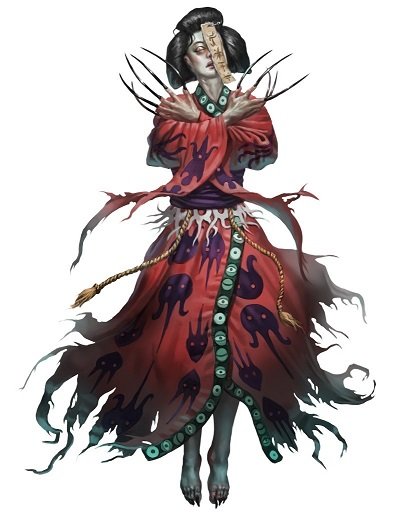
After hundreds of more years as flying jiangshi, if the beasts can survive that long, they evolve (or devolve as the case may be) into ba (魃). These are horrific and powerful demon-like creatures with powers over man and nature, and can even shapeshift. Reputedly they can cause droughts, and to this day are still blamed for it by villagers in some parts of China. Even worse, they bring plagues.
Originally, there was just one Ba. Ba, or Nv Ba (女魃), as she was called in the ancient texts, was the daughter of the Yellow Emperor Huangdi. The first mention of her as any kind of being was in the Shan Hai Jing (山海经) or Classic of Mountains and Seas. She wore green and was bald.
We are told that Huangdi was engaged in a great war against the war god Chiyou (蚩尤) who had called upon the wind and rain gods to bring storms and floods upon the earth. He called his daughter to help him, so she left the heavens to chase the Chiyou and his henchmen away. Wherever she went she brought drought, stopping the rains and drying up the floods. Unfortunately the droughts stayed wherever she stayed, destroying crops and bringing misery to the people.
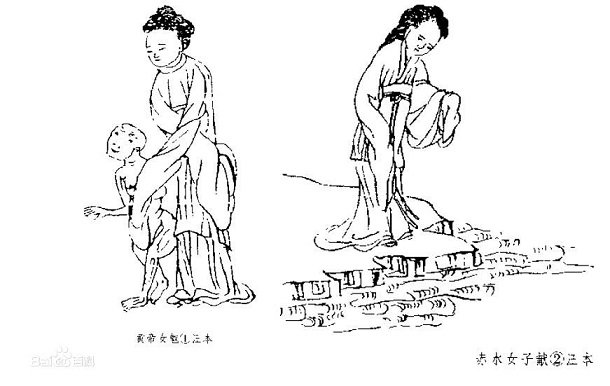
The remedy for this was to banish her to the north beyond the “Red Waters.” For some reason that is never stated nor explained, she was never allowed to return home to the heavens. Thus she often leaves her new home and wanders the earth bringing drought or plague wherever she goes.
Nowadays, it seems, other lesser jiangshi can aspire to “Ba-hood” and become ba. After hundreds of years of tormenting humanity, terrorizing villages, sucking blood and qi, and developing their supernatural powers, common, ordinary, run-of-the-mill, garden variety jiangshi can work their way up the ranks and take on the form and powers of the ba. These are terrible and fearless creatures.
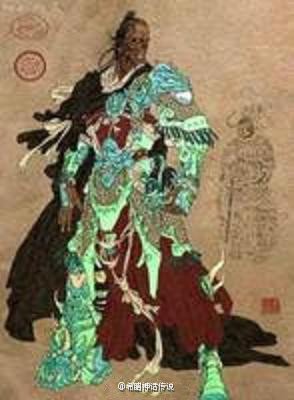
The ba are nothing compared to the next and final stage of jiangshi development—the demon king. It takes thousands of years to become a demon king, so there can’t be too many, but one is all you need to wreak terror, havoc and cataclysm. The demon king is consummately evil and has almost limitless powers. It is a scourge to mankind and the earth.
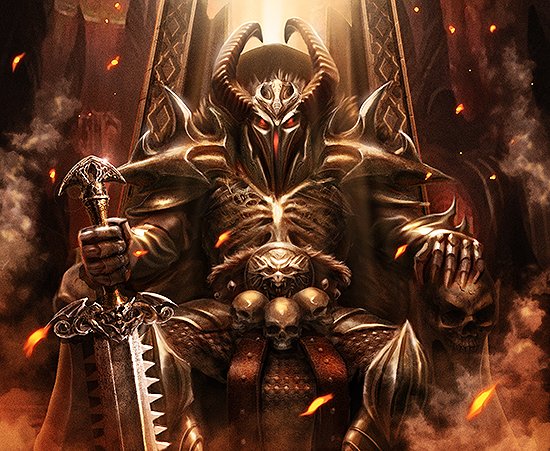
With all this evil lurking about, you need to protect yourself. Fortunately there are well-known and accessible methods of protection from jiangshi.
According to The Ancient Legends and Culture of Hanjiang Valley (荆楚岁时记 or Jing Chu Sui Shi Ji), a text from the 6th century A.D., the best protection overall is peach wood. Peach wood contains the essence of the five elements (Wu Xing 五行).
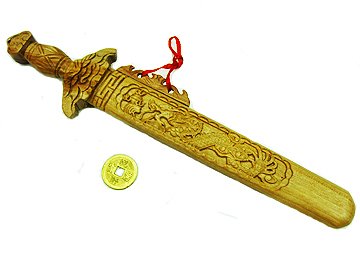
The five elements in Taoist alchemy are similar to the four elements (earth, air, fire and water) in Western alchemy. For those readers familiar with this, you may also recall that the European alchemists had a fifth but ethereal element called ether. My opinion is that the Taoists manifested this ether in their model as gold or metal (jin, 金). The five elements in Taoism are earth (tu,土), metal/gold (jin, 金), water (shui, 水), wood (mu, 木), and fire (huo, 火). One of the goals of Taoist alchemy is to unify these five elements through a practice called “fusion of the five elements.” Thus the disparate parts of the alchemist become integrated, giving him more wisdom, power, and continuity of purpose, which in turn allows him to repel evil auras and resist evil spirits.
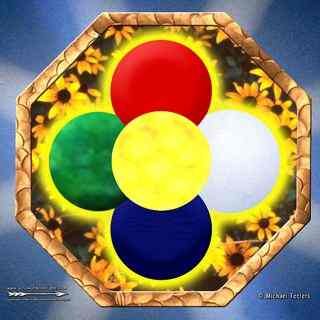
Thus peach wood has the same effect. Objects made of peach wood will help keep jiangshi away, and a stake of peach wood has the same effect as a stake of holly does against vampires. Remember how my student Albee prepared a peach stick in an earlier chapter in case she met the village ghost. So here we see the practice at work in modern times.
Roosters are another jiangshi repellant. Yuan Mei mentioned this in the Qing Dynasty text What the Master Didn’t Discuss (Zi Bu Yu, 子不语), a compilation of purportedly true supernatural tales. As stated above, the lower tier jiangshi are afraid of light, especially sunlight. A crowing rooster is, basically a public service announcement that the sun is about to rise. This sound, therefore sends jiangshi fleeing for their daytime hidey holes in caves, graves or caskets where they’ll be safe from the sunlight. Now if you could train a rooster to crow constantly at night….but then the jiangshi might catch on.
For the very daring among you, you can try jujubes. In China, this refers to “zao” (枣), often mistranslated as “dates.” They do bear a superficial resemblance to palm dates, but are actually more like apples in taste and texture and grow on deciduous hardwood trees of the buckthorn family, not related to palms at all. I mention this only because the mistranslation is a pet peeve of mine in China, especially since Ziziphus zizyphus was one of the over 600 plants I had to memorize for the Certified Professional Horticulturist Specialist in Woody Plant Identification test. It has since been renamed as Ziziphus jujube.
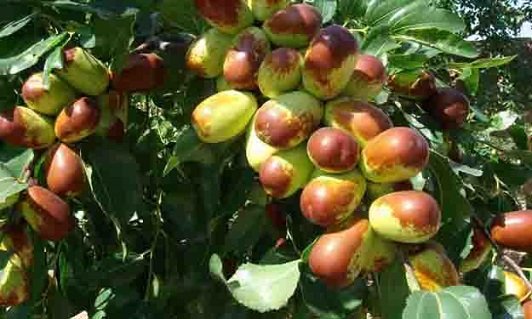
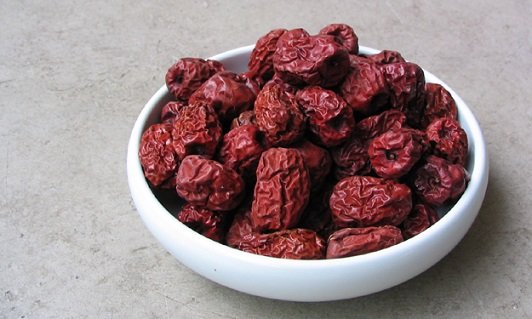
Be all this as it may, protecting oneself against jiangshi using jujubes is a pretty hairy operation. You have to nail the jujubes, physically nail them, to certain acupuncture points on the jiangshi. This means you have to get right up to it without it noticing. I have no idea how this is done, except that it may be possible while it is resting in its spider hole during the day. I advise strongly against trying this on ba and demon kings.
Another cure-all mentioned in the texts is fire. This is somewhat self-explanatory. What monsters aren’t destroyed by fire?
Yet another deterrent is sticky rice. Legend has it that the Black and White Guards of Impermanence or Hei Bai Wu Chang (黑白无常) in Chinese, take the souls of the deceased to the netherworld. The sticky rice, stuck over the body, appears like maggots to them, and they get confused thinking you must have been dead long enough to have had your soul taken already. Jiangshi get confused in a similar way and so avoid you in their feeding. I wonder, however, if the demon king would be so deceived.
A chalk line, of all things, is yet another deterrent. Chalk lines are used in woodworking or construction to make a straight line. You attach one end of the string (or get a partner to hold it) while you draw it out to the end, and then snap it. It literally leaves a chalk line to follow while cutting or perhaps laying a foundation or building a wall. The Chinese word for “straight” is “zheng” (正), which also means morally straight or virtuous. Thus the uprightness or moral correctitude represented by conspicuously displayed chalk lines repels jiangshi. It is recommended that black chalk or ink works best.
Since jiangshi are blind, they find their victims by listening or feeling for their breath. Thus holding your breath can be effective at saving yourself from a jiangshi. I doubt this would work against some of the higher-level, more developed classes though.
If you have access to a Taoist adept, he should be able to guard you against jiangshi and other forms of evil with Taoist incantations. I don’t know any of these incantations myself, but I imagine different kinds of jiangshi require different kinds of incantations and that more powerful jiangshi need more powerful priests to drive them off. Alternatively, you can learn Taoist alchemy yourself and complete the fusion of the five elements, white tiger/green dragon, sun and moon alchemy, and so on increasing your power to stave off evil.
The bagua is a universal repellant of evil as well. The bagua (八卦) is a Taoist symbol that often surrounds the yin-yang. Literally it means “eight symbols” and is comprised of the eight trigrams that represent basic cosmic forces. These trigrams are also part of the 64 trigrams of the I Ching. The eight trigrams of the bagua are typically illustrated around the eight sides of an octagon, with each side depicting one of the trigrams. In the center of this is usually depicted the yin-yang symbol. Now, numerous books have been written on the bagua, the yin-yang, Chinese philosophy, Taoism, and the I Ching, so I’m not going to get into a lot of detail here. You could say we already have literature on this “up the yin-yang,” as the expression goes. Readers not familiar with these topics can do their own research. Suffice it to say that the bagua combined with the yin-yang is a redoubtable symbol of cosmic force. This symbol hung around the house functions as a dream catcher placed in a window, or a silver cross displayed to a vampire.
A mirror is another good item to have handy to ward off jiangshi. Placing mirrors in each room of the house could keep jiangshi out of every room because they can’t stand to see their true nature reflected, in the same way a vampire can’t see its own reflection in the mirror. They therefore play an important role in fengshui (风水), the Chinese art of arranging space, whether indoors or outdoors, for maximum spiritual benefit and to ward off evil.
According to the Chinese Materia Medica, or Ben Cao Gan Mu (本草纲目), a Ming Dynasty compendium of medical and pharmaceutical knowledge, mirrors are liquid metal. They are interiorly bright but exteriorly dark. This bestows upon them spiritual power which the jiangshi dread, while also dreading their own reflection. A mirror at the center of a bagua is a potent charm against jiangshi. In fact, such mirrors are widely available in China today and commonly found in households and even automobiles.
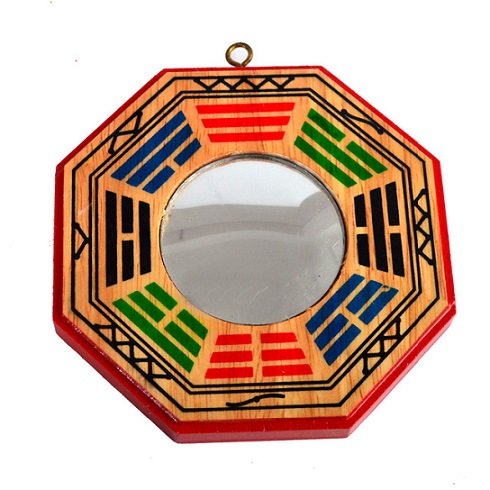
But this issue of mirrors being so detestable to evil spirits, including vampires in Western culture, is very instructive on the nature of evil. Evil, evil beings and evil people, by their nature have no capacity for self-reflection. People who display this characteristic are dangerous. They are deceitful, traitorous and inconsistent without even knowing it. They will stab you in the back and claim it is your fault. They will be the first to point out the crimes of others, and the last to see their own. They will enthusiastically support criminals, and then condemn the virtuous. They will murder millions and support the murder of millions, then claim it was for the good of their country or of humanity. Never, ever, will they ever be able to recognize their own maleficent natures. Unfortunately, this characteristic is all too common in bankers and politicians.
